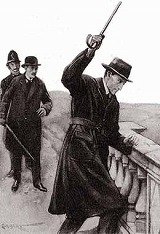“On the back, sir. No trace of a struggle. No marks. No weapon. The short note from Miss Dunbar was clutched in her left hand.”
“Clutched, you say?”
“Yes, sir, we could hardly open the fingers.”
“That is of great importance. It excludes the idea that anyone could have placed the note there after death in order to furnish a false clue. Dear me! The note, as I remember, was quite short:
“I will be at Thor Bridge at nine o’clock.
“G. DUNBAR.
Was that not so?”
“Yes, sir.”
“Did Miss Dunbar admit writing it?”
“Yes, sir.”
“What was her explanation?”
“Her defence was reserved for the Assizes. She would say nothing.”
“The problem is certainly a very interesting one. The point of the letter is very obscure, is it not?”
“Well, sir,” said the guide, “it seemed, if I may be so bold as to say so, the only really clear point in the whole case.”
Holmes shook his head.
“Granting that the letter is genuine and was really written, it was certainly received some time before - say one hour or two. Why, then, was this lady still clasping it in her left hand? Why should she carry it so carefully? She did not need to refer to it in the interview. Does it not seem remarkable?”
“Well, sir, as you put it, perhaps it does.”
“I think I should like to sit quietly for a few minutes and think it out.” He seated himself upon the stone ledge of the bridge, and I could see his quick gray eyes darting their questioning glances in every direction. Suddenly he sprang up again and ran across to the opposite parapet, whipped his lens from his pocket, and began to examine the stonework.
“This is curious,” said he.
“Yes, sir, we saw the chip on the ledge. I expect it’s been done by some passer-by.”
The stonework was gray, but at this one point it showed white for a space not larger than a sixpence. When examined closely one could see that the surface was chipped as by a sharp blow.

“It took some violence to do that,” said Holmes thoughtfully. With his cane he struck the ledge several times without leaving a mark. “Yes, it was a hard knock. In a curious place, too. It was not from above but from below, for you see that it is on the lower edge of the parapet.”
“But it is at least fifteen feet from the body.”
“Yes, it is fifteen feet from the body. It may have nothing to do with the matter, but it is a point worth noting. I do not think that we have anything more to learn here. There were no footsteps, you say?”
“The ground was iron hard, sir. There were no traces at all.”
“Then we can go. We will go up to the house first and look over these weapons of which you speak. Then we shall get on to Winchester, for I should desire to see Miss Dunbar before we go farther.”
Mr. Neil Gibson had not returned from town, but we saw in the house the neurotic Mr. Bates who had called upon us in the morning. He showed us with a sinister relish the formidable array of firearms of various shapes and sizes which his employer had accumulated in the course of an adventurous life.
“Mr. Gibson has his enemies, as anyone would expect who knew him and his methods,” said he. “He sleeps with a loaded revolver in the drawer beside his bed. He is a man of violence, sir, and there are times when all of us are afraid of him. I am sure that the poor lady who has passed was often terrified.”
“Did you ever witness physical violence towards her?”
“No, I cannot say that. But I have heard words which were nearly as bad - words of cold, cutting contempt, even before the servants.”